Avery Dennison (NYSE:AVY) Surprises With Q2 Sales

Adhesive manufacturing company Avery Dennison (NYSE:AVY) reported Q2 CY2024 results beating Wall Street analysts' expectations , with revenue up 6.9% year on year to $2.24 billion. It made a non-GAAP profit of $2.42 per share, improving from its profit of $1.92 per share in the same quarter last year.
Is now the time to buy Avery Dennison? Find out in our full research report.
Avery Dennison (AVY) Q2 CY2024 Highlights:
Revenue: $2.24 billion vs analyst estimates of $2.19 billion (1.9% beat)
EPS (non-GAAP): $2.42 vs analyst estimates of $2.26 (6.9% beat)
Raised full year EPS (non-GAAP) guidance
Gross Margin (GAAP): 29.6%, up from 26.5% in the same quarter last year
Free Cash Flow of $157.1 million, up 145% from the previous quarter
Organic Revenue rose 7% year on year (-10.4% in the same quarter last year)
Market Capitalization: $18.06 billion
“We delivered a strong second quarter, with significant earnings growth, driven by higher volume and productivity gains,” said Deon Stander, president and CEO.
Founded as Kum Kleen Products, Avery Dennison (NYSE:AVY) is a manufacturer of adhesive materials, display graphics, and packaging products, serving various industries.
Industrial Packaging
Industrial packaging companies have built competitive advantages from economies of scale that lead to advantaged purchasing and capital investments that are difficult and expensive to replicate. Recently, eco-friendly packaging and conservation are driving customers preferences and innovation. For example, plastic is not as desirable a material as it once was. Despite being integral to consumer goods ranging from beer to toothpaste to laundry detergent, these companies are still at the whim of the macro, especially consumer health and consumer willingness to spend.
Sales Growth
Examining a company's long-term performance can provide clues about its business quality. Any business can put up a good quarter or two, but the best consistently grow over the long haul. Unfortunately, Avery Dennison's 4% annualized revenue growth over the last five years was sluggish. This shows it failed to expand in any major way and is a rough starting point for our analysis.
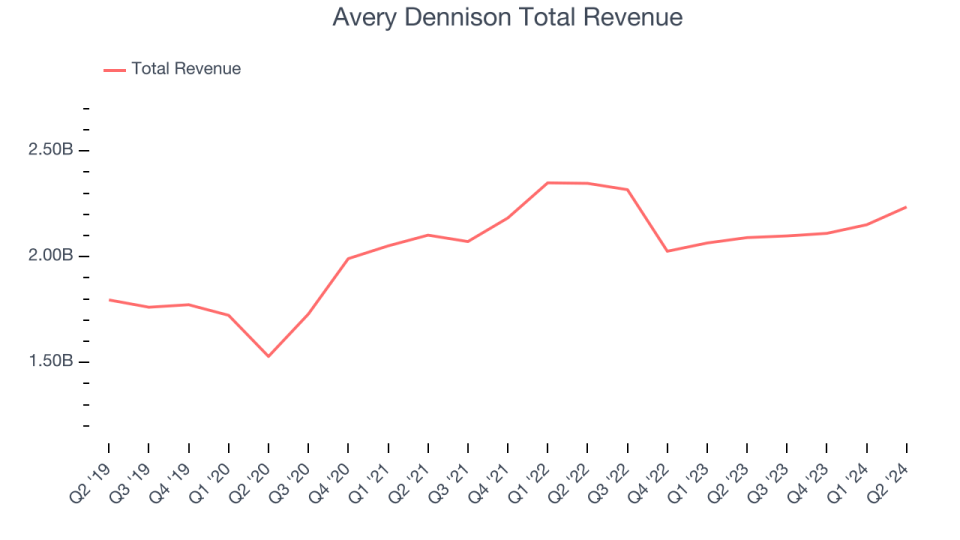
Long-term growth is the most important, but within industrials, a half-decade historical view may miss new industry trends or demand cycles. Avery Dennison's history shows it grew in the past but relinquished its gains over the last two years, as its revenue fell by 2% annually. Avery Dennison isn't alone in its struggles as the Industrial Packaging industry experienced a cyclical downturn, with many similar businesses seeing lower sales at this time.
We can better understand the company's sales dynamics by analyzing its organic revenue, which strips out one-time events like acquisitions and currency fluctuations because they don't accurately reflect its fundamentals. Over the last two years, Avery Dennison's organic revenue was flat. Because this number aligns with its normal revenue growth, we can see the company's core operations (not M&A) drove most of its performance.
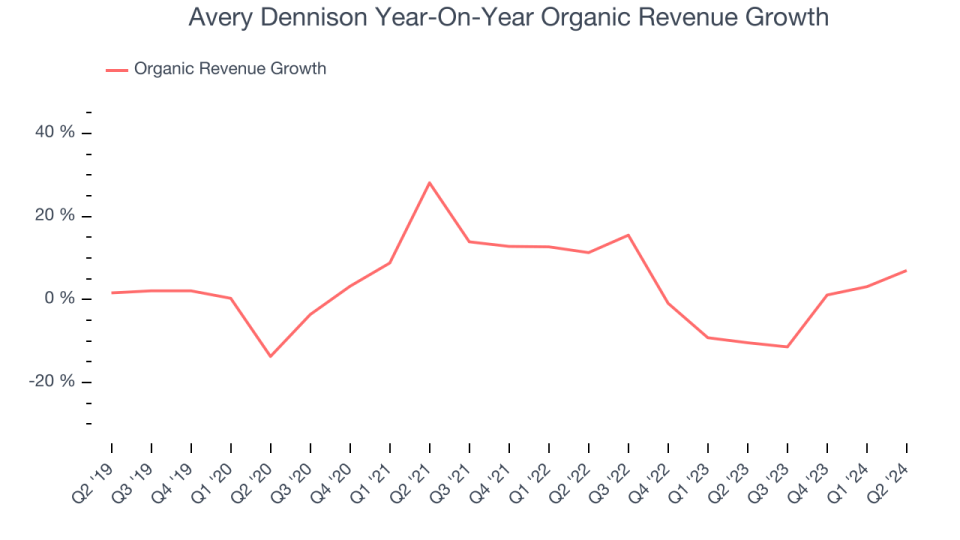
This quarter, Avery Dennison reported solid year-on-year revenue growth of 6.9%, and its $2.24 billion of revenue outperformed Wall Street's estimates by 1.9%. Looking ahead, Wall Street expects sales to grow 4.9% over the next 12 months, a deceleration from this quarter.
Here at StockStory, we certainly understand the potential of thematic investing. Diverse winners from Microsoft (MSFT) to Alphabet (GOOG), Coca-Cola (KO) to Monster Beverage (MNST) could all have been identified as promising growth stories with a megatrend driving the growth. So, in that spirit, we’ve identified a relatively under-the-radar profitable growth stock benefitting from the rise of AI, available to you FREE via this link.
Operating Margin
Read More Operating margin is a key measure of profitability. Think of it as net income–the bottom line–excluding the impact of taxes and interest on debt, which are less connected to business fundamentals.
Avery Dennison has managed its expenses well over the last five years. It demonstrated solid profitability for an industrials business, producing an average operating margin of 11.3%. This was particularly impressive because of its low gross margin, which is mostly a factor of what it sells and takes huge shifts to move meaningfully. Companies have more control over their operating margins, and it's a show of strength if they're high when gross margins are low.
Analyzing the trend in its profitability, Avery Dennison's annual operating margin might have seen some fluctuations but has generally stayed the same over the last five years. We like to see margin expansion, but we’re still happy with Avery Dennison's performance, especially when considering the cycle turned in the wrong direction and most peers observed plummeting revenue and margins.
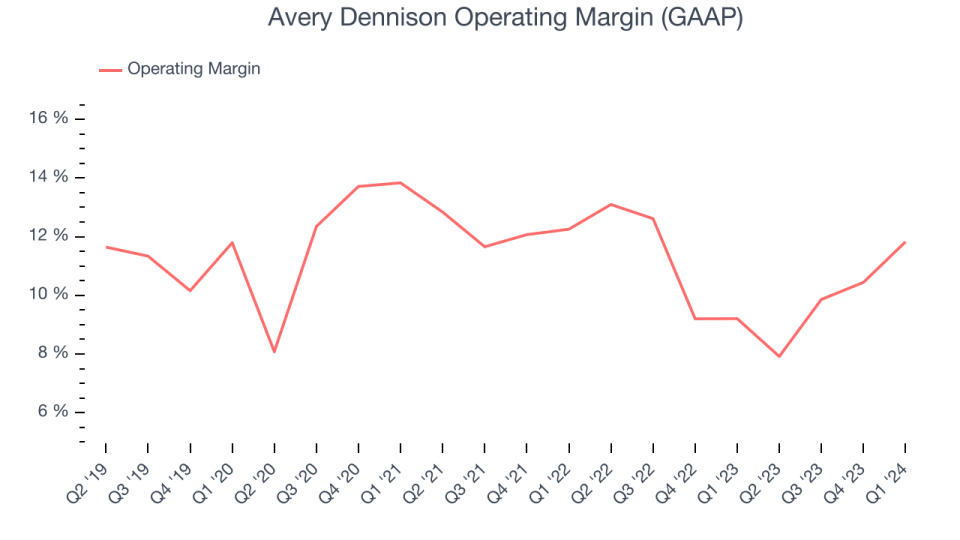
EPS
Read MoreAnalyzing long-term revenue trends tells us about a company's historical growth, but the long-term change in its earnings per share (EPS) points to the profitability of that growth–for example, a company could inflate its sales through excessive spending on advertising and promotions.
Avery Dennison's EPS grew at an unimpressive 7.7% compounded annual growth rate over the last five years. This performance was better than its 4% annualized revenue growth but doesn't tell us much about its day-to-day operations because its operating margin didn't expand.
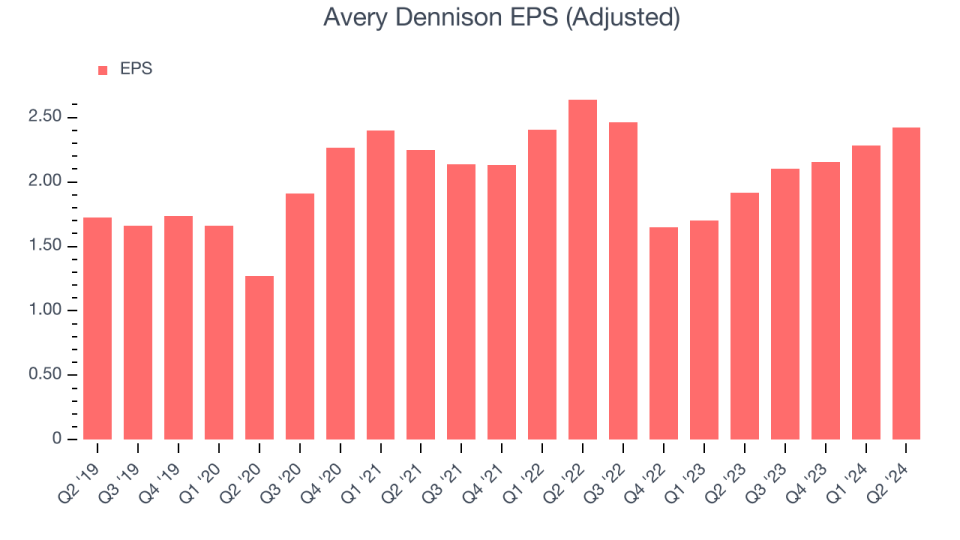
We can take a deeper look into Avery Dennison's earnings to better understand the drivers of its performance. A five-year view shows that Avery Dennison has repurchased its stock, shrinking its share count by 4.8%. This tells us its EPS outperformed its revenue not because of increased operational efficiency but financial engineering, as buybacks boost per share earnings.
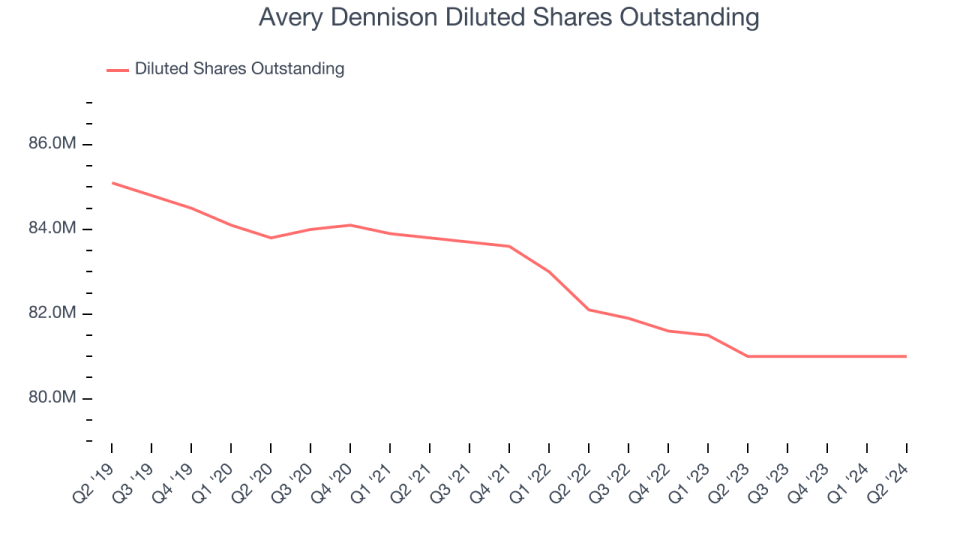
Like with revenue, we also analyze EPS over a more recent period because it can give insight into an emerging theme or development for the business. For Avery Dennison, its two-year annual EPS declines of 1.9% show its recent history was to blame for its underperformance over the last five years. These results were bad no matter how you slice the data.
In Q2, Avery Dennison reported EPS at $2.42, up from $1.92 in the same quarter last year. This print beat analysts' estimates by 6.9%. Over the next 12 months, Wall Street expects Avery Dennison to grow its earnings. Analysts are projecting its EPS of $8.96 in the last year to climb by 12.9% to $10.11.
Key Takeaways from Avery Dennison's Q2 Results
We were impressed by how significantly Avery Dennison blew past analysts' organic revenue expectations this quarter. We were also excited its revenue outperformed Wall Street's estimates. The company also raised its full year guidance for EPS. Overall, we think this was a strong quarter that should satisfy shareholders. The stock remained flat at $225.31 immediately following the results.
Avery Dennison may have had a good quarter, but does that mean you should invest right now? When making that decision, it's important to consider its valuation, business qualities, as well as what has happened in the latest quarter. We cover that in our actionable full research report which you can read here, it's free.

 Yahoo Finance
Yahoo Finance 